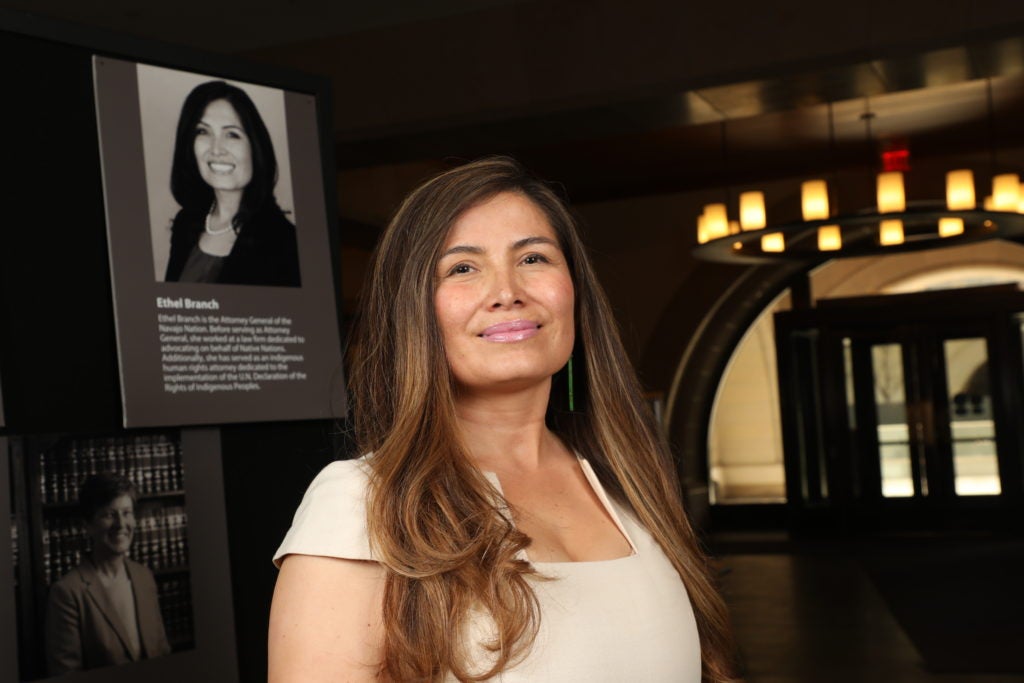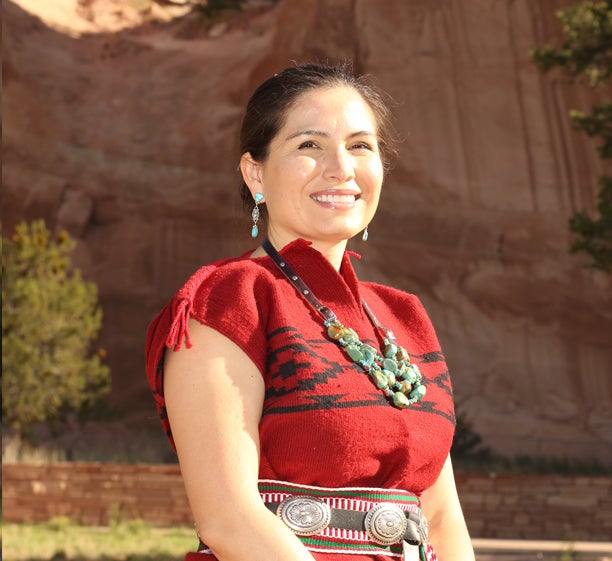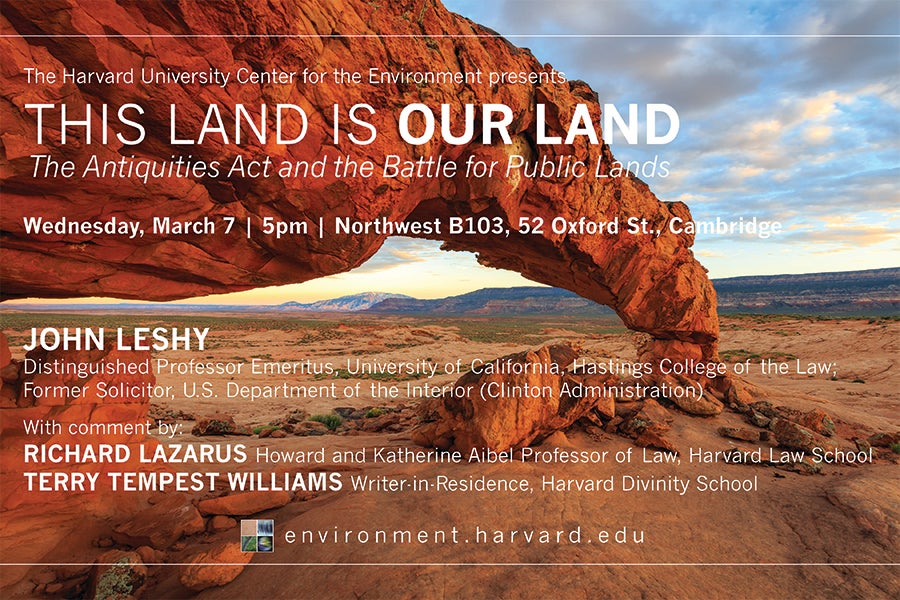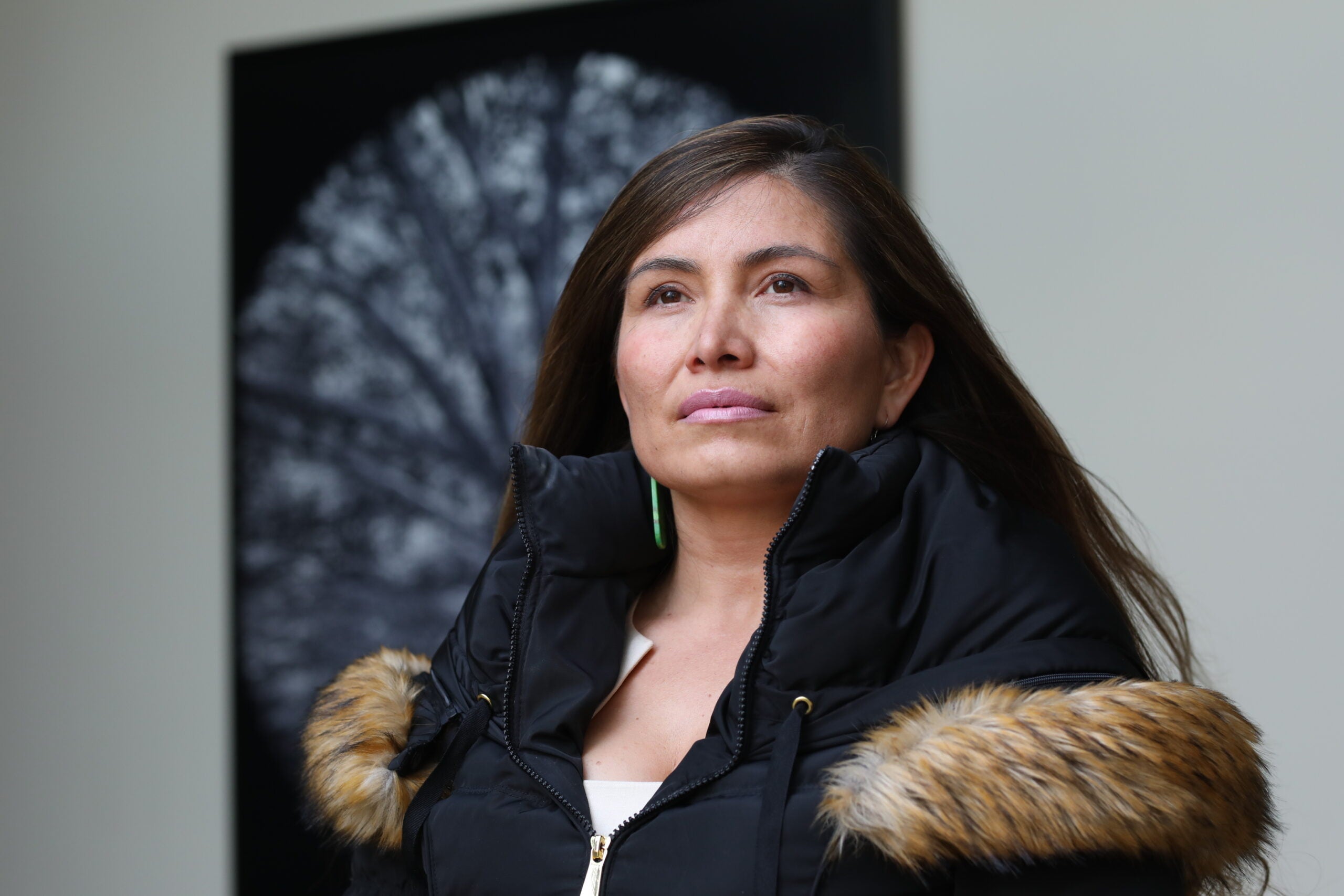Ethel Branch ’08 grew up on her family’s ranch with no electricity, no running water, and a long list of questions about injustice.
Why did she have to walk to an outhouse in the hot summer, when 20 miles away in Winslow, Ariz., even the poorest kids had air conditioning and running water?
Why were there power plants and transmission lines criss-crossing the Navajo Nation, but so few Navajo families with electricity?
Why did she feel like she had more in common with the children pictured in National Geographic than with her non-Indian classmates in school?
Her family’s sheep and cattle ranch on the outskirts of Leupp was six miles from the nearest paved road. Mud or snow could quickly make the dirt roads impassable; so as a child, she often lived with relatives rather than her parents so she could make it to school reliably.
As she grew up, Branch knew she had to address these questions. “That confusion as to why the world changed when you crossed the Navajo Nation boundary line was a driving question for my youth and my life,” says Branch. It propelled her to study law and policy. And three years ago, at age 36, it led her to become Attorney General of the Navajo Nation.

“This is my dream role,” says Branch, from her office in Window Rock. “It’s the most fun I will ever have. It’s practicing law in every conceivable way possible.” As head of the Navajo Nation Department of Justice, she oversees a staff of 88, handling all the legal affairs of the sprawling Nation, which extends into Arizona, New Mexico, and Utah in a land area the size of West Virginia. The department includes the Office of the Prosecutor, which has 9 district offices that cover 13 district courts, the Office of Juvenile Justice, the Navajo-Hopi Legal Services Program, and the six Units of the Department (Water Rights, Natural Resources, Economic and Community Development, Human Services and Government, Tax and Finance, and Litigation). She helped form a public corruption task force, battled white collar crime, drafted legislation, spearheaded an initiative to revise the Navajo criminal code, and launched a collaborative, annual Public Safety Summit that pulls Navajo governmental partners together to focus their limited, existing resources on maximum impact in reducing violence, substance abuse, and suicide on the Nation. “It’s so diverse. Every single day is so different and challenging and fascinating, and this is all done in service to my nation and my people. There is no greater honor,” Branch says.
Progress can be elusive and uneven, however. Branch estimates that half her work is suing the U.S. government to enforce treaties and agreements, and to otherwise protect and defend the rights of the Nation. In December, she filed a suit against President Donald Trump after his proclamation to shrink drastically the size of the Bears Ears National Monument in southern Utah, removing the land protections established under President Barack Obama ’91. Under her leadership, the Department is suing the USEPA and other parties for their hand in contaminating Navajo waters in the Gold King Mine spill, challenging Wells Fargo for its targeting of Navajo consumers in its unfair business practices, battling states to maintain jurisdiction over trust land leased to public school districts, and suing county governments for violating the voting rights of Navajo tribal members, among many other issues, ranging from water rights to uranium cleanups.
And she wages a constant and uphill battle against lawmakers, judges, lawyers, and the general public who don’t understand tribal sovereignty. “In high school history books, Indian tribes are mentioned in the first chapter and never again, suggesting we no longer exist and we’re historic relics,” says Branch. “It’s so detrimental when you have justices who grew up and exist in an America that has largely failed to acknowledge the presence of tribes as governments and the history of native peoples.”
***
Harvard College was a long way from Winslow High School. Branch excelled at both, majoring in history at Harvard, and writing her senior thesis on the history of Native students at Harvard.
After college, she returned to the Navajo Nation to teach school and “open up doors of access for Navajo children.” Like her, many of the children lived away from their parents, either because their homes were far away from the schools or because the lack of businesses on Navajo land meant parents had to live elsewhere to earn a living.

She knew that to really have an impact on Navajo children’s lives, she would have to take on the development challenge. Accordingly, she returned to Harvard in 2004 to pursue a joint degree at the law school and the Harvard Kennedy School. Few classes were directly applicable to Navajo Law. Most of that she learned was done through personal research projects, including her HLS-HKS paper on Navajo governmental reform. She took Tribal Legal Systems with Carole Goldberg, who then held the Oneida Indian Nation Visiting Professorship at HLS, and Federal Indian Law with Alex Skibine, who also held the Oneida Visiting Professorship. “A class I should have taken is local government law,” Branch said. “Tribal governance is somewhat of a blend of state governance, municipal governance, and federal governance.”
Navajo officials have been discussing the need for a Navajo law school. “We have a tremendous need for local government lawyers, and really the way to ensure that there are more attorneys on the Nation and more help available to all aspects of our local governments is to have more law-trained Navajos,” Branch said, noting that recruiting lawyers is a perennial challenge. “We have a strong mix of Navajo and non-Navajo attorneys, but there’s a certain level of turnover among both categories, and there are just not enough people who are trained and practicing law here. The geographic isolation, limited on-reservation housing, and lack of urban lifestyle accoutrements often mean that only the most dedicated remain with the Department long-term, and those are usually people whose families live here, and who are committed to strengthening Navajo law and governance. Those people tend to be Navajo people who grew up here on the Nation.”
***
Branch sought legal experience away from the Navajo Nation before returning there as AG. She knew when she did come back, she would be given many responsibilities, and she wanted to be ready to shoulder them. She practiced tribal finance law at the firm Orrick, Herrington & Sutcliffe, in Portland. Then she was an associate at Kanji & Katzen, in Seattle, which focuses solely on Native advocacy.
In 2015, Navajo Nation President Russell Begaye asked Branch to be the 11th Attorney General of the Navajo Nation. She was originally seeking the Deputy AG position. Branch did a lot of soul searching and consulting with friends and mentors before agreeing to accept the top job. Nearly three years in, she calls it a wild ride. “Politics is the Navajo national sport,” she says. “It’s not basketball or rodeo.”
Professor Joseph Singer ’81, Bussey Professor of Law and Branch’s 1L Property Law professor, describes Branch as thoughtful and wise. “She’s not only a good lawyer in a technical sense, but she has a very powerful sense of the social context in which law operates.”
Robert Anderson, the current Oneida Visiting Professor at HLS, says that Branch is very adept at bridging the two worlds she inhabits. “She’s a real role model and leader in the Indian Law field,” he says. “She has a winning personality; she’s brilliant; she’s a tireless advocate. The Navajos couldn’t be better off than having her at the helm.”
Branch returned to Harvard Law School to speak in the fall of 2017 for an Indian Law Conference. In April, she’ll participate in a presentation on the Bears Ears National Monument litigation, part of the HLS in the Community Bicentennial Celebration.

On April 20, Harvard Law School will celebrate HLS in the Community, a bicentennial event focused on all the ways HLS alumni, students, faculty, and staff are using their talents to transform local and global communities.
Ethel Branch will return to HLS for the bicentennial event to participate in a panel on The National Monuments Litigation: The impact of executive power on the future of land management.
As the Trump administration exerts executive power to reduce the size and protections of existing national monuments across the country, parties are challenging this new approach to land management. Branch will join HLS Clinical Professor Wendy Jacobs ’81, director of the Emmett Environmental Law and Policy Clinic; Lois Schiffer ’69, former general counsel of the National Oceanic and Atmospheric Administration; and Shelley Chapman ’81, United States Bankruptcy Judge, Southern District, New York, to debate the presidential authority to change previously designated national monuments, and to discuss what the cases could mean for future land management and planning.
” read_more_link=”http://200.hls.harvard.edu/events/hls-in-the-community/” read_more_text=”More about HLS in the Community” float=”center” background_color=”robin_blue”]
She speaks to raise awareness about Native issues and to encourage Native American law students to go back to their communities. And Branch urges HLS to continue to build its Native law curriculum. “I would love it if the law school would acknowledge tribes as the third sovereign and do more to acknowledge tribal governments as legitimate, pre-constitutional governments vested with inherent sovereign rights,” she says. She’d like to see Native issues woven into constitutional law classes and all aspects of the curriculum, not just relegated to Indian law electives.
Writing her undergraduate thesis, Branch learned that the founding Harvard Charter of 1650 stated that the institution would be dedicated to “the education of the English & Indian Youth of this Country in knowledge: and godliness.” At the college and at the law school, Branch said, “that mission should be taken more seriously. When Harvard was most vulnerable, resources intended to advance the mission to the Indians were used to buoy the University, but no Indians benefitted. Today, Indian country greatly needs the resources of Harvard to help strengthen our communities and institutions, and today there are many Indian youth eager to access these resources to enrich our nations. There is no better time for Harvard to embrace its founding mission by opening its doors wide to Indian country.”
***
Related Event
This Land is Our Land: The Antiquities Act and the Battle for Public Lands

Wednesday, Mar. 7, 2018, 5 – 6 p.m.
Northwest B103, 52 Oxford St., Cambridge
John Leshy, Distinguished Professor Emeritus, University of California, Hastings College of the Law; Former Solicitor, U.S. Department of the Interior (Clinton Administration)
With comment by Richard Lazarus, Howard and Katherine Aibel Professor of Law, Harvard Law School, and Terry Tempest Williams, Writer-in-Residence, Harvard Divinity School
